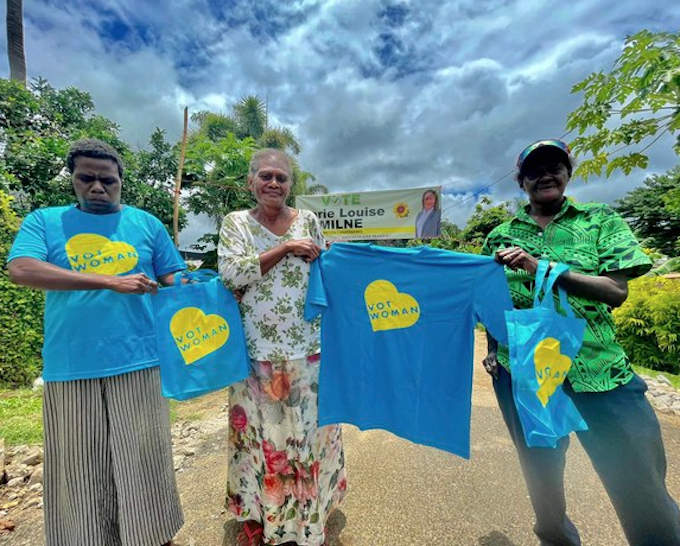In the age of information, misinformation is undoubtedly the biggest epidemic. Last year, the World Economic Forum said that India was at the “highest risk of misinformation and disinformation”. For Alt News, 2024 was anything but ordinary. From debunking claims that god was put behind bars to investigating rumours of multiple fractures and 150 grams of semen being found in the postmortem report of a junior doctor who was raped and killed at Kolkata’s R G Kar Medical College and Hospital, Alt News had its hands full.
The 2024 Lok Sabha elections, which spanned for over a month — between April 19 and June 1— were pivotal. As political parties kicked off their campaigns, we saw a spurt in not only misinformation but also hate speech. Through the year, Alt News documented several such instances. This includes speeches by Prime Minister Narendra Modi, whose pre-poll communal rhetoric blatantly disregarded the Election Commission guidelines.
The second round of the farmers’ protests, attacks on Rafah refugee camps in Palestine, student protests in Bangladesh, the R G Kar rape and murder and ongoing violence in Manipur were other major events that shaped 2024, unleashing, in its wake, a flood of misinformation and targeted hate against certain communities.
Through the past year, Alt News published 347 reports in all. Of this, in at least 299 stories we fact-checked viral claims, often false and peddling misinformation. This included misinformation that was viral on social media as well as misreporting by media outlets. In the remaining 48 stories, we documented instances of targeted hate speech and hate crimes (read this and this), platform accountability by big tech (examples 1, 2) and also did deep-dive investigations (for instance, this and this) and analysed coverage patterns by news publications (1, 2 and 3). More on this later.
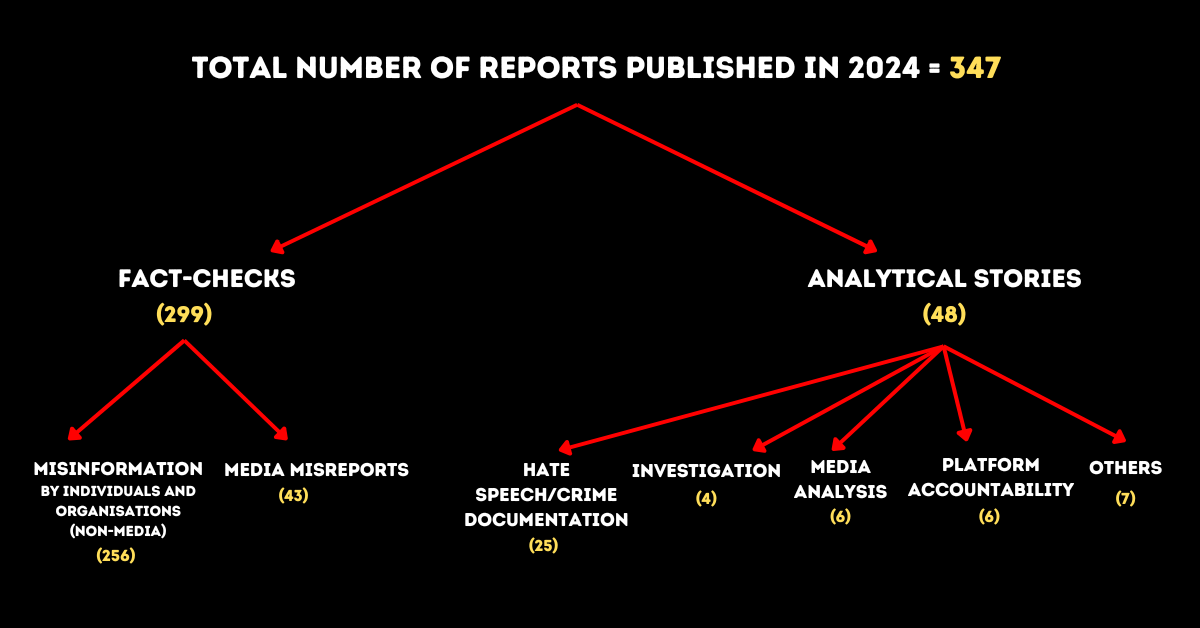
The ‘Others’ category in the above graphic refers to stories that do not exactly fall under the aforementioned categories. Take, for instance, our story on Dharmendra Pradhan going from ‘no corruption’ to assuming ‘moral responsibility’ all within a week amid allegations that the National Eligibility-cum-Entrance Test papers were leaked; or our story on the desperate search for a sabotage theory amid several train accidents.
Let’s take a closer look at some of the themes that dominated our coverage, sources from where most misinformation emerged and the medium most effectively used to disseminate this as well as who some of the biggest targets were.
A Recap of the Year That Went By
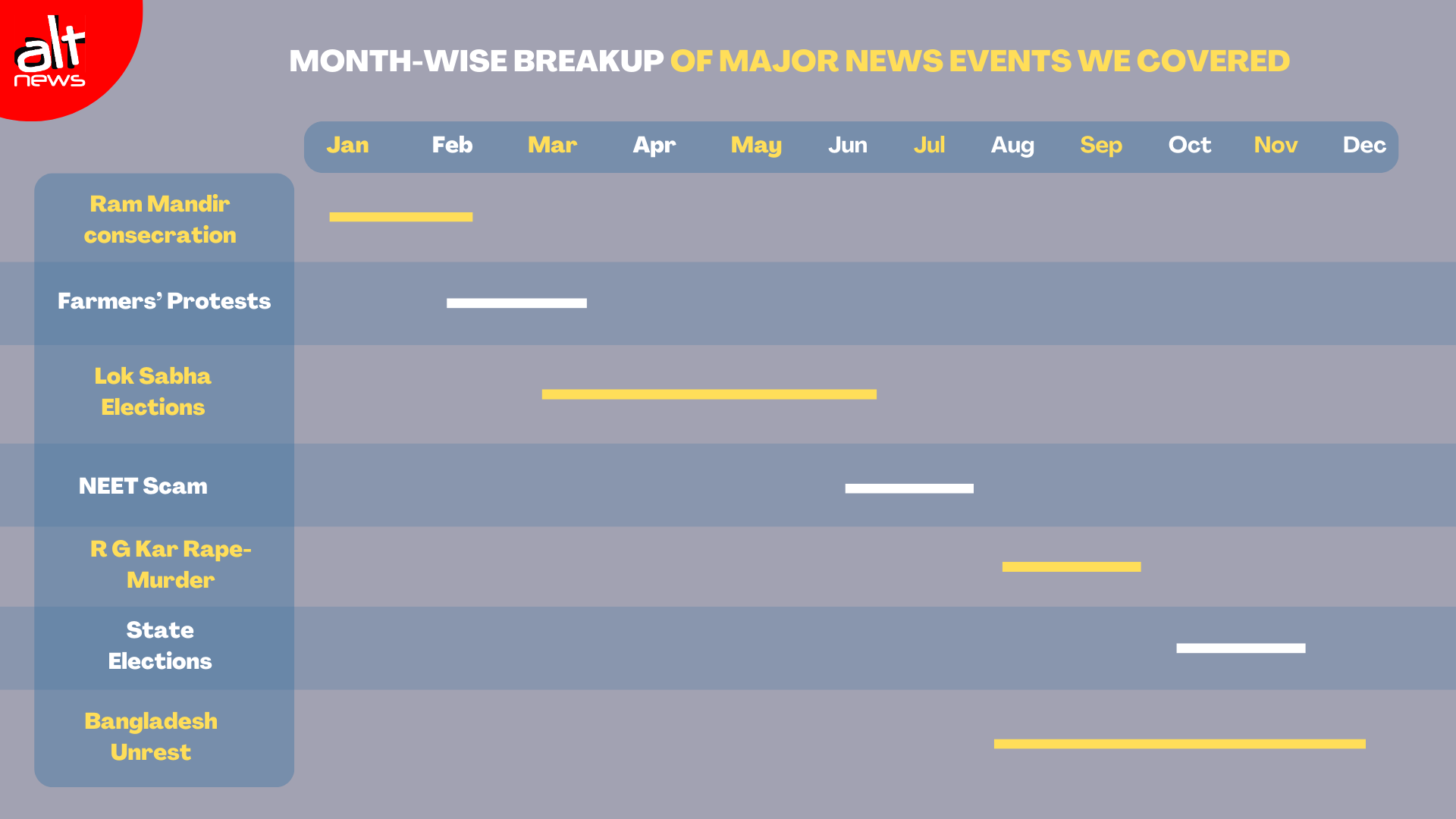
The Lok Sabha elections dominated the news cycle in the first half of the year. Between April and June, Alt News conducted 42 fact checks on election-related misinformation. Nearly 31% of such misinformation targeted the Congress while 24% targeted the ruling Bharatiya Janata Party. We documented multiple instances wherein the model code of conduct set by the Election Commission was blatantly violated. We also wrote about the polling body’s reluctance to act against violations by the BJP or its leaders.
Our reportage looked into several instances in which pre-poll campaign speeches delivered by the Prime Minister himself were the source of misinformation or targeted hate, violating the model code of conduct (Read here, here and here). Post results, our analysis showed that the BJP lost in at least 20 constituencies where PM Modi delivered hateful or communal speeches.
In February 2024, farmers held the second round of protests demanding that the government mandate a minimum selling price (MSP) for all crops and waive off their debt. Our first fact-check report related to the farmers’ protests was published on February 16, barely three days after their ‘Delhi Chalo’ march began. In February alone we debunked eleven claims that spread misinformation about the protests.
In May, Israel launched airstrikes in Rafah, Gaza, killing at least 20 civilians. Soon after this, several social media users who associate themselves with the Right resorted to sharing distasteful edits of a viral AI image that said “All Eyes on Rafah”. Our deep dive looked at how distorted versions of this image, originally made to show solidarity with affected Palestinians, were now trivialising Palestinian casualties. Indians, especially celebrities, who shared the viral image were trolled for talking about atrocities happening “thousands of miles away”.
Between July and September, we fact-checked claims related to the Manipur conflict. An important story by us on Manipur was a misreport by the news channel Republic. On September 3, Republic aired a video purportedly showing a boy firing a man-portable air defence system and labelling it as ‘exclusive’ footage of Manipur insurgents attacking a village. Our investigation found that the video was actually from Myanmar and had no connection to Manipur whatsoever. Another important story by Alt News on Manipur was a media analysis of Hindi news channels’ partisan reportage of Congress leader Rahul Gandhi’s visit to Manipur in July.
In August, a junior doctor at Kolkata’s R G Kar Medical College and Hospital was raped and brutally murdered in her sleep. The incident shook the country. It also resulted in a massive wave of misinformation and false narratives being widely shared as public knowledge. Most mainstream Indian media houses too fell short of delivering verified and credible information. Between August and September, Alt News verified at least 12 false claims related to the R G Kar rape and murder. A fourth of these were misreports by the media. (Read here, here and here)
Around the same time, student protests in Bangladesh also began taking a violent turn. The aftermath of the protests, which eventually resulted in Sheikh Hasina’s government being overthrown, also generated a massive spurt of misinformation that the country continues to reel under. Through the year, Alt News published at least 35 fact-check reports debunking misinformation from Bangladesh.
Other key events that shaped our coverage were the allegations of corruption and paper leaks surrounding the National Eligibility-cum-Entrance Test and the indictment of Indian billionaire Gautam Adani and senior Adani group executives by a United States court.
Majority of Fact Checks Dealt with National Politics, Communal Misinformation
Broadly, our fact-check reports dealt with five major categories: communal misinformation, religious misinformation and claims related to national politics, international affairs and sectarian conflicts. Misinformation targeting specific communities, often with the intent of fostering harmful and offensive narratives, was categorised as communal misinformation In contrast, reports involving claims that mention a particular religion but did not necessarily target that community were classified as religious misinformation. Claims related to political parties, party leaders or their statements were classified as national politics, while those mentioning world affairs were categorised as international. Stories verifying claims targeting certain ethnic groups were classified under sectarian. Most of our Manipur coverage has been classified under this classification.

Stories that did not strictly fall under the above categories were classified as ‘others’.
As the data shows, 42% of Alt News’ fact-check reports published last year debunked claims related to national politics. Our coverage included fact-checking Union home minister Amit Shah’s claims about the West Bengal government not providing Durga Puja holidays, LoP Rahul Gandhi purportedly carrying the Chinese constitution in election campaign meetings and OpIndia editor Nupur J Sharma misquoting the Supreme Court.
This was followed by communal misinformation, which accounted for 39% (118 reports) of all fact-check reports we published. We looked into claims related to the Mira Road clashes in February 2024, how the rape of a Spanish vlogger in March was given a false communal spin and how surveillance footage by Ranchi police during Ram Navami was used by social media users to falsely target the Muslim community.
Fact checks dealing with international news made up 4% of misinformation we verified, religious misinformation was at 3% while misinformation targeting sects made up 1%. Other stories such as a protestor at the R G Kar protests being misidentified as a doctor, OpIndia inaccurately fact-checking Live Law or an AI image of Algerian boxer Imane Khelif going viral constituted 11% of the claims we debunked in 2024.
A Look at the Biggest Misinformation Peddlers
To authenticate the veracity of most viral claims, we often need to track down the source of misinformation and from where it all took off. Interestingly, many of these sources identified in our reports were repeat offenders. These sources include social media accounts of political parties, party leaders, news outlets, journalists and prominent social media users.
Prominent social media users—usually those with a fair number of followers—were further split into three groups based on the content they usually share. Social media users who frequently appeared in our fact-checks and publicly identified with Right-wing ideology or frequently endorsed content by the BJP were classified as pro-Right social media users. Users such as @MrSinha_, @SaffronSunanda and @arunpudur, whose social media posts we have often fact checked, fall under this category. The classification also includes propaganda outlets such as OpIndia, Sudarshan News and Panchjanya, which openly identify with or are affiliated with the Right. Meanwhile, anti-Right social media users include those who openly counter or oppose the BJP or Right-wing narrative, such as Prashant Bhushan (@pbhushan1). ‘Other social media users’ include individuals who share misinformation but do not have any clear political leanings.

In the graph, media misreports refer to instances where news outlets were the source of misinformation. When a falsehood was shared by independent journalists or posted by influential correspondents (not necessarily their publications) the source is classified as journalists. Other political parties and their leaders include Trinamool Congress, Telugu Desam Party, Shiv Sena (UBT) and Samajwadi Party.
As the data clearly shows, pro-Right social media users were the biggest proponents of misinformation in 2024. A third of all misinformation Alt News fact checked last year was propagated by this group. The second-biggest source of misinformation was other social media users propagating claims such as the Golden Temple being surrounded by churches, sharing footage of a Dhaka student league leader being ‘punished’ as an attack on Hindus or misattributing cattle slaughter in Bangladesh to West Bengal.
Meanwhile, 14% of the misinformation we fact checked was shared by official handles of the BJP and its party leaders combined; the Congress and its leaders accounted for 3% of the misinformation we verified.
Ironically, media—dubbed democracy’s fourth pillar—was the fourth-largest source of misinformation in Alt News’ reports last year, accounting for 14% of claims we fact checked.
We also found that in 113 of the 126 fact-check reports dealing with political misinformation nationally, the source was either political parties, politicians themselves, influential individuals or other social media users. The media was the source of political misinformation in 13 instances.
Pro-Right social media users had a major role to play in spreading communal misinformation. These users were the source of misinformation in 58% of the 118 communal claims we debunked last year. These users were a key source of misinformation at a time when there was a surge in cases of violence against Hindu minorities in Bangladesh. In several other stories, we point out how unrelated images, videos and claims were being shared by this group as cases of atrocities against Hindus in Bangladesh. In 2023 as well, when the Israel-Palestine conflict was at its peak, we had seen that a lot of anti-Palestine misinformation came from Indian social media users.
Most Misinformation Targeted Muslims

While misinformation campaigns targeted many including political parties, religious and ethnic communities and prominent individuals. Based on our reports, the Muslim community was the most frequently targeted; 32% of our fact-check reports featured misinformation singling out this community. (Read here, here and here)
The Congress and its leaders were the second-most targeted group (16%), followed by the BJP and its leaders (10%). Other religions in the graph include Buddhists, Christians, and Kukis while other political parties refer to AAP, AIMIM, CPI(M), Samajwadi Party, Shiv Sena (UBT), Telugu Desam Party and YSRCP.
Most Fact Checks Based on Video Claims
Medium is a key factor in the spread of misinformation. We focused on five broad mediums through which much of the fake news we verified was spread. This included videos, claims, images, audio and news.
Claims here largely refer to text in social media posts (such as X or Facebook posts and viral WhatsApp messages) and statements made by influential individuals during campaigns or in media interactions.
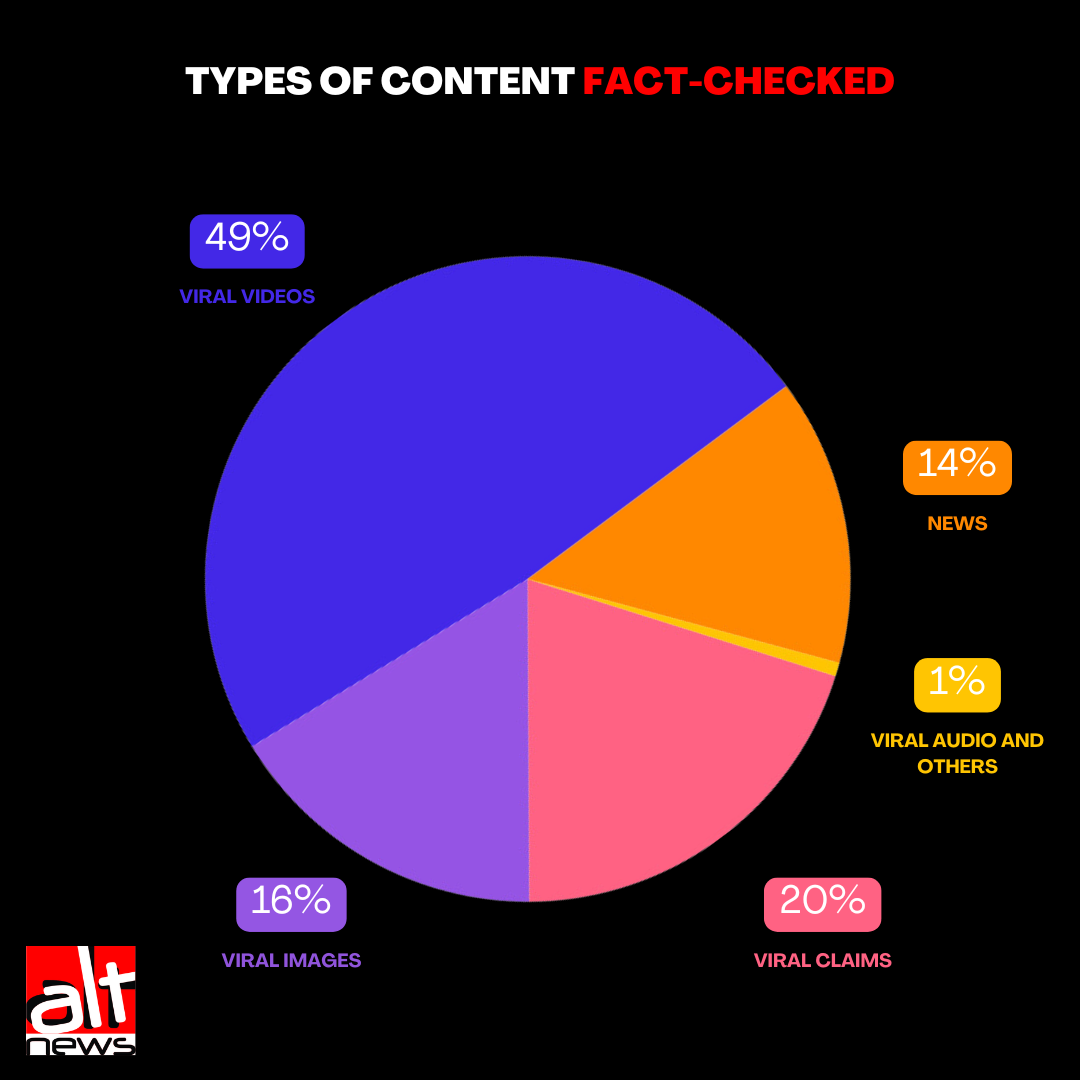
Videos accounted for approximately 49% of the content we verified this year. This was followed by viral claims, accounting for approximately 20% of the content we checked in 2024.
One category of viral videos we encountered, especially during election season, was clipped videos. These are usually montages created using bits and pieces of video footage, eliminating some key information and context in the process. Take, for instance, the time when BJP leaders shared a clipped video of Rahul Gandhi’s maiden speech as Leader of Opposition. They claimed that Gandhi called the entire Hindu community violent. However, as our story clarifies, his comments were an attack on far-right political organisations like the BJP and the RSS and not the Hindu community as a whole. Here is a link to the full story. Misinformation was also spread through morphed or scripted videos.
In 2024, viral claims, which often surface during a major or unusual occurrence or news event, were mostly communal in nature. For instance, a few days after news broke of the trainee doctor being raped and murdered at Kolkata’s R G Kar Medical College and Hospital, claims that three Muslim doctors were the primary accused began circulating. Through elaborate ground reports, Alt News verified that none of the three was close to the scene of the crime when the incident took place.
Around the same time, other claims such as the scene of the crime being vandalized and 150 grams of semen being found in the rape victim’s body also surfaced and went viral. Our investigation found the claims to be completely bogus. Interestingly, this claim was also amplified by media outlets including Barkha Dutt-led Mojo Story, Republic, The Times of India and Business Today among others.
This brings us to the next medium through which misinformation can be spread: News. Through the year, approximately 14% of what we fact-checked was owing to misreporting by media outlets.
It’s important to mention here that these categories are not watertight compartments and there are some overlaps. For instance, clipped videos often make their way into coverage by news publications. During the farmers’ protests in Punjab and Haryana in February, a clipped video of farmer leader Jagjit Singh Dallewal went viral. In this video, Dallewal purportedly urged listeners to brainstorm how PM Modi’s popularity, which soared after the Ram Mandir consecration, could be “brought down in a few days”. Our investigation revealed that the clip was edited and some parts from the original video were cut, distorting the context as a result. This edited video was circulated on social media and then aired by major news outlets including TV channels such as News18, India TV, Zee News, Times Now Navbharat, India Today and Republic among others. The video was also shared by news agency ANI.
Images were another common proponent through which misinformation was spread and accounted for 16% of the content we fact-checked. Misinformation through images can be spread by distorting photos using photo-editing tools or AI or by passing off old images as new or presenting them out of context to suggest something else.
For instance, in March, an image showing former Union minister Smriti Irani ‘belly dancing’ went viral. Our fact check revealed that the original picture was digitally altered and Irani’s face overlaid. Similarly, in another case, edits using an AI tool made it seem like Sonia Gandhi was holding a cigarette.
We also found several cases wherein official handles linked to political parties shared misinformation, especially around elections. In May, many state accounts of the BJP shared a poster claiming that under the party’s regime, 20 Indian cities had metro rail connectivity—a significant jump from 2014 when only five cities had them. The poster had a savvy metro train with elevated tracks in the background and PM Modi in the foreground. However, the image of the metro used in the poster is from Singapore and not India.
Besides these, we also fact checked WhatsApp chain texts, fabricated quotes and unveiled fake social media accounts.
Deep Dives by Alt News
Last year we published 41 long-form stories including documentation of communal speeches and hate crimes, investigative reports, media analyses and issues with platform accountability.
In February, our investigation unearthed a complex web of fake handles on X (formerly Twitter) running fraudulent fundraisers benefiting a ‘Sandeep Mandal’.
Alt News was instrumental in documenting hate speeches throughout the year, especially during the Lok Sabha elections which saw a major spike in communal speeches. Even PM Modi left no stone unturned in amplifying the party’s anti-Muslim rhetoric, dubbing Muslims as those who “have more children” and “ghusapethiyon” (infiltrators). We also looked at the Election Commission’s shortcomings in curbing the BJP’s communal speeches. Read our stories here, here and here.
With technology playing such a crucial role in the spread of misinformation, we did several stories on the cross-section of politics, society and technology platforms. In one such story, we looked at political ad spending on Meta, which operates Instagram and Facebook, around the elections and found that the BJP had invested the most in advertisements on the platform. Expenditure by BJP’s proxy pages — accounts that support the party by promoting its posts and ads but are not officially affiliated with it — was much higher.
In another report, we looked at how Meta failed to check the misuse of its ad system by allowing political ads glorifying someone getting shot and killed.
Deepfakes & Elections
Before the year began, experts had warned that AI and deepfakes would fuel misinformation in an unprecedented manner in the 2024 Lok Sabha elections.
There were a handful of instances such as AI-voice cloning being used to manipulate a video of actor Aamir Khan to make it seem like he was endorsing the Congress. Similarly, AI was used to swap the voice of actor Ranveer Singh and make it sound like he was criticising PM Modi.
Apart from these, we did not find deepfakes having a major impact on the election or its outcomes but we did see AI-generated content catching up in a bigger way after the Lok Sabha elections. In November, we fact checked a viral video that used actor Amitabh Bachchan’s AI-cloned voice to make it seem like he was making scathing remarks on the state of affairs in the country. Days after the 2024 Paris Olympics and the controversy over Algerian boxer Imane Khelif being allowed to compete in the women’s category, a bare-chested image of hers was viral on social media. In this image, which we found to be AI-generated, Khelif was shown with very masculine features, reigniting the debate surrounding her gender identity. More recently, we verified another viral image, manipulated using AI, to make it seem like Rahul Gandhi was smashing 140 coconuts in a show of strength after the BJP tried to claim that he admitted to ‘dhakka-mukki’ in Parliament.
Authenticating some of these AI clips also made us realise that this area continues to pose a major challenge for fact checkers. For instance, just before assembly elections in Maharashtra, the BJP released audio clips alleging that opposition leaders were trying to illegally encash bitcoins. The audio clip was a purported call recording of Maha Vikas Aghadi leaders Supriya Sule and Nana Patole talking to an IPS officer and an audit firm employee. Sule claimed that the audio was AI-generated. This was backed by several fact-checking organisations. Alt News, however, could not publish any report on this because we were unable to independently verify whether the clip was factual or fake without using external AI tools that flag AI-generated content. Since these tools have been inaccurate in the past, there was no conclusive way to determine the authenticity of the audio.
We foresee the year 2025 to bring on more challenges, albeit of a different kind. With the United States undergoing a regime change, communal and media-based misinformation continuing unabated and Meta shutting down its fact-check initiative, the onus will be on us to put in more hard work and keep at what we do, perhaps in larger volumes.
The post 2024: The year when misinformation shaped elections, fuelled hate and aided conspiracy theories appeared first on Alt News.
This content originally appeared on Alt News and was authored by Oishani Bhattacharya.
This post was originally published on Radio Free.
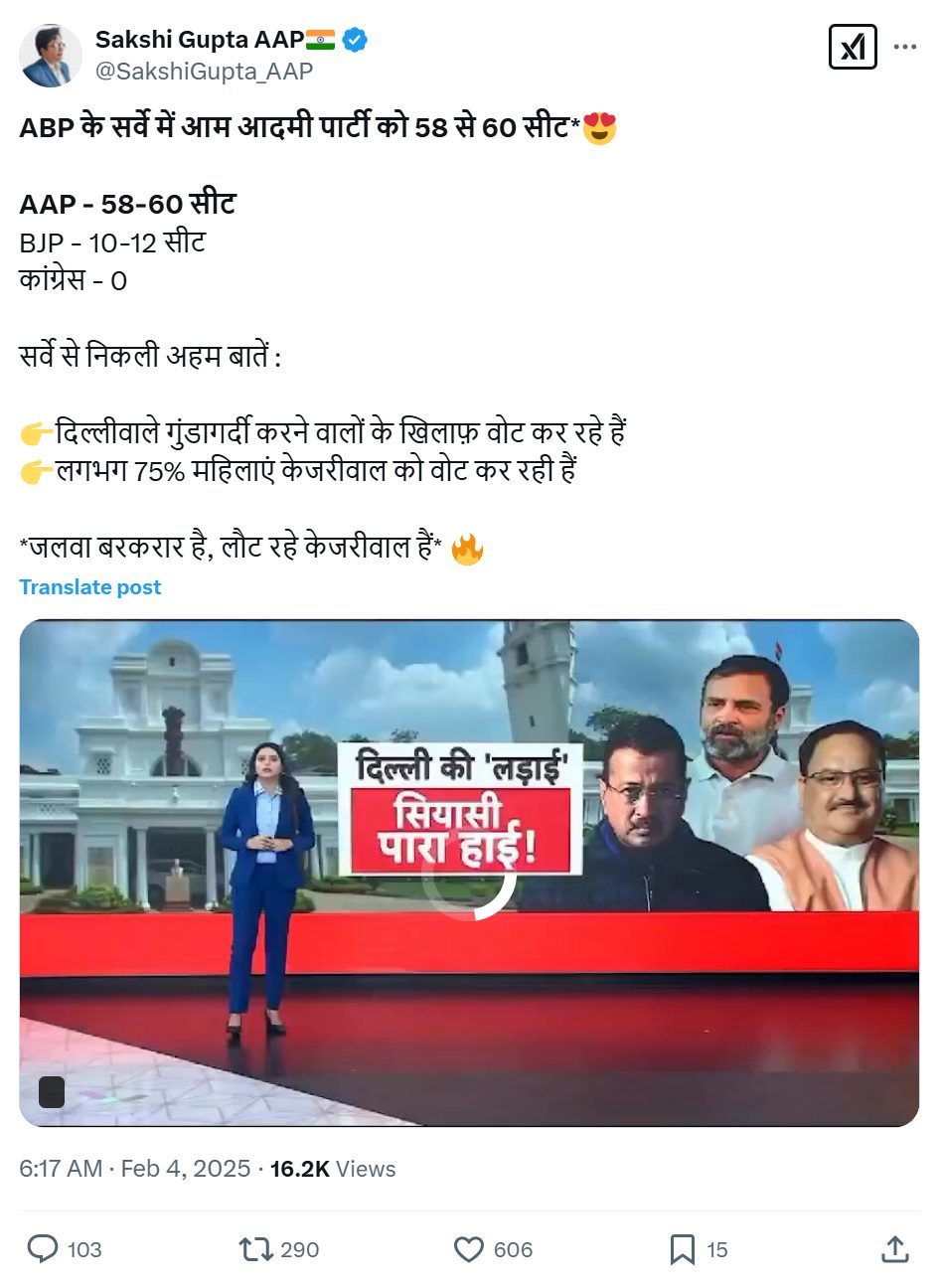


 केजरीवाल का फिर से मुख्यमंत्री बनना तय
केजरीवाल का फिर से मुख्यमंत्री बनना तय 





